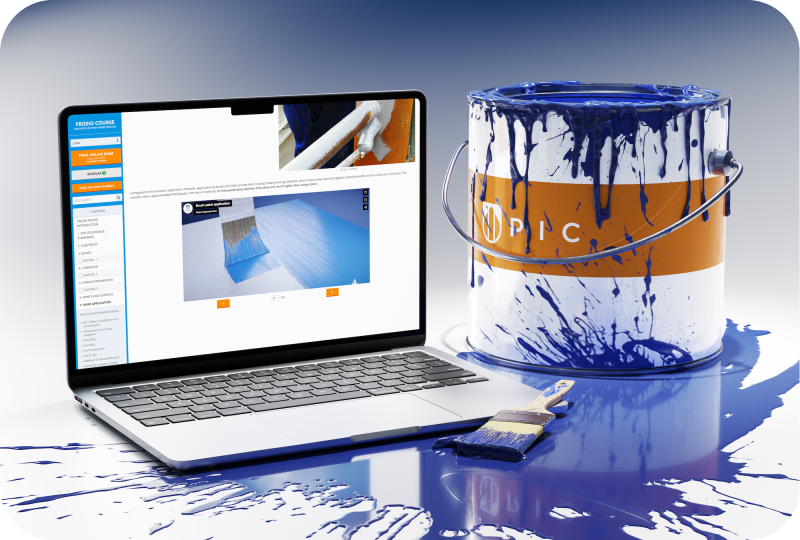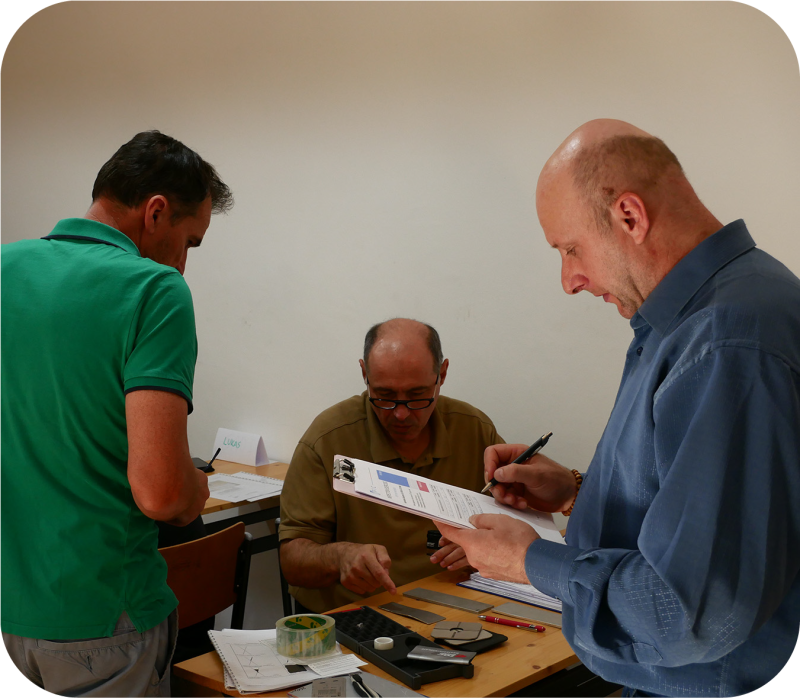About FROSIO Paint Inspector Course
The Paint Inspector course provides foundational knowledge of paint inspection methods and thorough understanding of coatings, corrosion, its causes and prevention. Learn about standards and specifications, how varied coatings and materials interact, what makes good design in corrosion protection and more that will equip you for this crucial role.
This course incorporates theoretical and practical study and examination. Upon successfully passing the exam students are awarded with the FROSIO surface treatment inspector certificate level based on their experience.
Course created according to the FROSIO curriculum defined by the FROSIO council.
| This certificate is required for individuals who want to work on projects following the NORSOK standard. |
Contents:
- Online prep-course
- Mock exam
- Online webinars
- Online learning support group
- Classroom training and FROSIO exam
- Additional information

Course structure
The course is made up of online self-study materials, live webinars and classroom training: all a requirement for attending the final FROSIO exam.
We've made the course modular to best fit your schedule: you may purchase the full course right away, or take the online prep and in-class parts separately.
This course is available in English, Spanish and Portuguese.
Online prep course
Our online platform lets you track your progress, take quizzes and knowledge checks, watch educational videos and animations produced in-house. With audio included, you can listen to lessons on the go. Each chapter contains an instructional video with tips and tricks from your instructor.
| You may purchase the online prep-course separately and get access for up to a year in order to brush up on your knowledge or prepare for the FROSIO exam at your own pace. Please keep in mind that completing the online prep-course is one of the three requirements for attending the FROSIO exam and gaining certification. |
Duration:
40-50 hours of self-study.

Learning modules:
- Specifications and standards
- Substrates
- Design
- Corrosion
- Surface preparation
- Paints and coatings
- Paint application
- Paint defects
- Zink-rich paints
- Metallic coatings
- Special-use coatings
- Calculations
- Concrete
- Requirements for execution of works and QC
- The role of the inspector
- Inspection work
- Reporting
- HSE
- PSPC introduction
Mock exam
The mock exam lets you test your knowledge before the final FROSIO exam. It comes in two variants:
- For those who purchase the online course only a multiple choice practice exam is made available.
- Those who purchase the full course get access to a mock exam that is graded by our instructors. You get to test your knowledge with a set of open-ended questions. You get 3 tries at the mock exam, each with a different variation of questions than the last. This is the best way to prepare for the FROSIO theoretical exam.
Mock exam deadline: The mock exam will become accessible 31 days before the final FROSIO exam. We will check your answers and get back to you within 5 business days. Once you receive your results a new mock exam will become available to you until you've tried them all out. You can take your mock exam 11 days before the final FROSIO exam at the latest, so our examiners have time to review your answers. In the last 11 days leading up to the exam, you may still fill out the mock exam, but there is no guarantee that it will be graded by our instructors. This is a valuable tool to prepare for the FROSIO exam, but plan ahead if you wish to try your hand at all variations of our mock exam.
Online webinars
Attend a series of 4 expert-led webinars that will cover important theory and give you the opportunity to engage with our trainers.
Online support group
Join our Whatsapp group and leave no question unanswered. We’re there to provide practical examples, fill knowledge gaps and help you learn in the way that best suits you. Along with practical information, get webinar reminders and links to short and quick quizzes covering the course topics.
And after class is done, this is where we plan to meet up and get to know fellow students and colleagues in the field of paint inspection.
Classroom training
Our instructors are knowledgable professionals with over 25 years of industry experience. They will cover important theoretical concepts and provide valuable hands-on training.
They will share tricks of the trade, cover case studies and answer any questions you may have.
Practical training is provided in the use of inspection tools and methods. 15 inspection stations are provided for students to develop and test their skills.
The final day in the classroom is reserved for the FROSIO exam.
| You may book your spot for the in-class training separately and join the class at any of the locations listed on the courses page. Please keep in mind that attending in-class training is one of the three requirements for attending the FROSIO exam and gaining certification, and you must purchase the online prep-course before the in-class training. |

Practical stations:
- Rust grades evaluation station
- Corrosion types evaluation station
- Microclimatic conditions station - psychrometer, dew check calculator, magnetic thermometer
- Roughness station - ISO comparators
- Cross-cut test station – cross-cut and X-cut test
- Inorganic zinc silicate curing test station
- Paint identification station
- Bresle salt test station
- Low Voltage test station
- High Voltage test station
- Paint defects station
- Pull-off test station
- DFT gauge station
- PIG gauge station
- Daily log station
Duration:
3 to 6 days of training and the FROSIO exam day. For bigger groups of students and in-house training, the number of days spent in class can be adjusted on request.
FROSIO exam
The examination includes a theoretical and practical part each four hours long. To meet the requirement for certification, the candidate must pass both parts of the examination, which will be conducted in conjunction with the training course. If the candidate does not pass one of the two parts, this part must be retaken and passed within 5 years.
A candidate that does not pass the examination has two further attempts to pass. Thereafter, the candidate must attend a new training course.
A passed examination has a validity of 5 years.
Plan your studies
Click here to get our Study Guide for all you need to know about planning your studies and taking the best advantage of what our course has to offer.